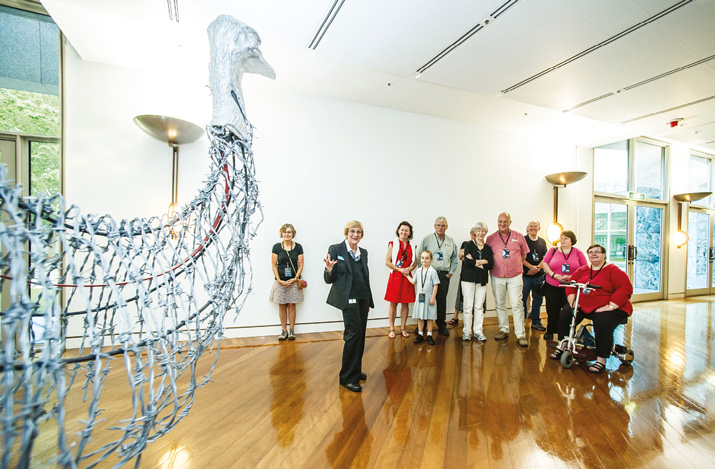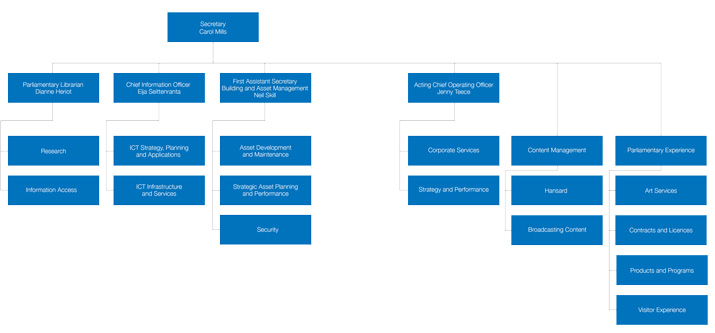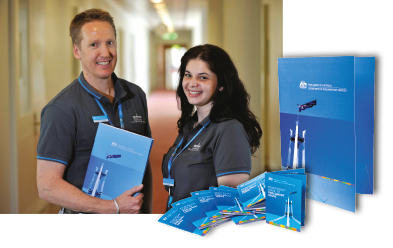Role and functions
The Department of Parliamentary Services (DPS) supports the functioning of Parliament and parliamentarians through the provision of professional services, advice and facilities and by maintaining Australian Parliament House as a working and iconic building.
DPS services include ICT, the Parliamentary Library, Hansard, broadcasting services and security. The Department also provides catering, retail and recreation facilities, manages the Parliament House Art Collection, maintains the building and cares for its heritage, and provides services to almost 700,000 people who visit the building each year.
DPS is the largest of the four parliamentary departments which together comprise the Parliamentary Service. The other departments are the Department of the Senate, the Department of the House of Representatives and the Parliamentary Budget Office.
The Parliamentary Service carries out its work independently of the Executive Government of the Commonwealth.
DPS operates under the Parliamentary Service Act 1999 and—during 2013–14—the Financial Management and Accountability Act 1997.
The President of the Senate and the Speaker of the House of Representatives (the Presiding Officers) are jointly responsible for DPS.
Outcome and program structure
DPS has one outcome: Occupants of Parliament House are supported by integrated services and facilities. Parliament functions effectively and its work and building are accessible to the public.
DPS has two programs:
- Program 1: Parliamentary Services
- Program 2: Parliament House Works Program
Strategic direction statement 2013–14
The Department of Parliamentary Services provides essential services to support the work of the Parliament, maintain Parliament House as a symbol of democracy, and ensure that the important activity that takes place within it is accessible and engaging for all.
The Department is building on its foundation of service excellence by developing innovative and adaptive approaches that will shape the services it delivers to the occupants of, and visitors to, Parliament House.
Areas of priority for the Department are to:
- Strategically plan to maintain and enhance Parliament House as both a working place and major public venue
- Provide information and communication technologies that support the Parliament and connect with the wider community
- Enable physical and virtual access to the Parliament to engage with, and meet the needs of, a diverse range of occupants, visitors and the community
- Support the work of Parliament to ensure its effective function and duties
- Ensure the Parliament’s assets are cared for and respected and its heritage value is maintained for future generations.
DPS Portfolio Budget Statements 2013–14
Services provided by DPS
Information and communication technology services
DPS manages the infrastructure and delivery of ICT services to all occupants of Parliament House and to all Electorate Offices across the nation. This includes service design, implementation and support in the form of a central help desk, training, the provision of software and hardware, and management of the Department’s relationships with external ICT providers. DPS’ objective is to ensure ICT services to more than 5,400 registered users in both Parliament House and Electorate Offices remain available, secure and are of a very high quality. These services are underpinned by ICT standards and policies and are aligned to the Parliament of Australia ICT Strategic Plan to support the work of the Parliament.
Library and research services
The Parliamentary Library provides information, research and analytical services to Senators and Members and their staff, parliamentary committees and the parliamentary departments. Services are not provided to constituents or for commercial purposes.
The range of services provided includes individually commissioned information, research and advisory services for clients and research publications, including Bills Digests.
The Library manages access to print and electronic resources. These resources include books, serials, information databases, electronic publications developed both within the Department and acquired externally, off-air recordings and transcripts. Access to services is also provided through the Parliamentary Library’s Central Enquiry Point and the Senators’ and Members’ Reading Room.
Hansard and broadcasting services
DPS is responsible for transcribing and publishing (Hansard) and broadcasting and archiving the proceedings in the Senate and the House of Representatives (including the Federation Chamber) and parliamentary committee hearings.
Parliamentary proceedings are broadcast within Parliament House, webcast via the internet and a feed is provided to the media. DPS also provides audio coverage and transcription services for parliamentary committee hearings held around Australia and public address systems at the venues for these hearings.

DPS’ Greg Coppin and his colleagues assist Parliament House occupants when they call the 2020 ICT Support Desk.
Security services
DPS provides and maintains security at Parliament House to support the function of Parliament and protect workers and visitors, while ensuring that the building remains open and accessible to the public. This is achieved through the provision of a range of internal and external security services to occupants of, and visitors to, Parliament House, including access control at all entrance points and a mobile and static security presence throughout Parliament House. DPS also operates an extensive security system across the parliamentary precincts.
Building management services
DPS is responsible for the maintenance of the exterior and interior of the building, and the parliamentary precincts landscape. The Department also manages utility services such as electricity and gas, and provides heating and cooling, and hydraulic services including plumbing, drainage and water supply.
Heritage
The Australian Parliament House is considered an important 20th century building of heritage value. It is Australia’s national icon of democracy and is significant as the place where major decisions are made that impact on the daily life of all Australians. The carefully integrated design of building, furniture, art and craft, and landscape together tell the story of the nation’s history and its achievements. DPS is charged with the protection and management of the outstanding heritage values of Parliament House while guiding the evolution of the building in its service to the Parliament and people of Australia. As custodians DPS has the responsibility to conserve, present and interpret these values for current and future generations.
Art Services
DPS manages the extensive Parliament House Art Collection—acquiring, cataloguing, researching, digitising, conserving, preparing and presenting works of art to the highest possible museum standards. It allocates and installs artworks in Senators’ and Members’ suites and in the circulation spaces throughout the building, and develops and presents displays and exhibitions.

Visitor Services Officer, Gina Hall, taking a group of visitors on a behind-the-scenes tour of Parliament House.
Visitor services
DPS provides a range of visitor services and facilities including guided tours for visitors and school groups, events and exhibitions, The Parliament Shop and Queen’s Terrace Cafe.
Other services to support parliamentarian and building occupants
DPS provides a range of services to support parliamentarians and building occupants including food and beverage services, a health and recreation centre, post office, banking and financial services, a child care centre, travel agent, health and recreation centre, nurses centre, physiotherapist, hairdresser and florist. It also provides a photographic service, Auspic.
Corporate, administrative and strategic services
DPS’ corporate and strategic areas provide advice and services to the DPS Executive and staff on a range of governance, strategic, financial, procurement, human resources and records management matters. This ensures that DPS complies with its responsibilities under the Parliamentary Service Act 1999, the Financial Management and Accountability Act 1997 and a range of other legislative obligations, including human resources-related legislation. In addition, these areas provide a range of corporate services to the Parliamentary Budget Office on a fee-for-service basis.
Departmental structure
DPS is established as a Department under the Parliamentary Services Act 1999. The Act provides that the Department consists of a Secretary of the Department, together with the Parliamentary Librarian and Parliamentary Service employees assisting the Secretary. The Secretary is Chief Executive (CEO) and is the leader of DPS’ senior executive team.
As part of a realignment which commenced in 2012–13, to further strengthen DPS’ accountability and planning capacity, a Chief Operating Officer Division was created bringing together planning, governance and corporate functions. This completes the structural realignment of the Department.
The Parliamentary Librarian is the holder of a statutory office established by authority of the Parliamentary Services Act 1999. The Parliamentary Librarian reports directly to the Presiding Officers—the Speaker of the House of Representatives and the President of the Senate—and to the Joint Standing Committee on the Parliamentary Library in respect of her statutory functions. For the exercise of normal management functions, including as detailed in the Parliamentary Service Act and the Financial Management and Accountability Act 1997, the Parliamentary Librarian reports to the Secretary, DPS.
Figure 1 shows DPS' organisational structure at 30 June 2014.
Organisational structure
Figure 1: DPS organisational structure at 30 June 2014

Senior Executive
Secretary, Carol Mills
Carol Mills commenced her term as Secretary, DPS on 28 May 2012. Prior to this Ms Mills held a number of senior positions in the NSW public service including Director-General of the NSW Department of the Arts, Sport and Recreation, and of Communities NSW. Ms Mills was also Deputy Director-General of the NSW Department of Ageing, Disability and Home Care, and the Department of Housing. Ms Mills has significant experience as a member of numerous boards and committees including The Sydney Festival, National Arts School, NSW Institute of Sport and the Sydney Film Festival. Ms Mills holds qualifications in public policy, economics and business management.
Parliamentary Librarian, Dianne Heriot
Dr Dianne Heriot was appointed as Parliamentary Librarian in May 2012, having acted in that position since February 2012. Prior to that, she was Assistant Secretary of the Research Branch of the Parliamentary Library. Dr Heriot has many years’ experience in senior management positions in the Australian Public Service (APS) including in the Attorney-General’s Department and the Department of the Prime Minister and Cabinet. She has a Bachelor of Arts (Hons), Master of Arts (Medieval Studies) and Doctor of Philosophy in Literature.
Chief Information Officer, Eija Seittenranta
Eija Seittenranta commenced as the Chief Information Officer at DPS in October 2012. Prior to joining DPS, Ms Seittenranta held a number of senior positions in ICT in the APS. Ms Seittenranta’s public service career was broken by a two-year stint working overseas for Standard Chartered Bank in an ICT executive role and a year to complete her MBA. Since re-joining the public service, Ms Seittenranta has held senior ICT positions with Centrelink, the Department of Health and Ageing, and the Department
of Human Services.
First Assistant Secretary Building and Asset Management, Neil Skill
Neil Skill commenced with DPS as First Assistant Secretary Building and Asset Management in January 2014. Since 2001, Mr Skill has held various executive level positions in the APS including within the Australian Taxation Office, the Department of the Prime Minister and Cabinet, the Department of Finance and Administration, the Future Fund, the Department of Human Services and the Department of Immigration and Border Protection. His roles have focused on corporate support functions, including property management, business continuity, human resources, project management and security. Mr Skill has been a member of the senior executive service (SES) since 2007.
Prior to joining the APS in 2000, Mr Skill attended the Royal Military College, Duntroon, held management positions in the private sector and operated a small business.
Acting Chief Operating Officer, Jenny Teece
Jenny Teece joined DPS as Assistant Secretary, Strategy and Performance Branch in March 2013 and has been acting in the Chief Operating Officer position since February 2014.
Ms Teece has extensive executive experience in the APS having worked in a variety of areas including the management of ministerial, parliamentary and executive support divisions, the integration of the Department of Human Services portfolios’ service delivery channels, and emergency management. Ms Teece has a Bachelor of Arts majoring in Education, Psychology and Social Theory and holds professional membership with the Incoming Calls Management Institute, the Customer Operations Performance Centre Inc. and the Corporate Leadership Council.
Client service excellence at DPS
To coincide with the commencement of the 44th Parliament, DPS introduced a more customer friendly service delivery model designed to give parliamentarians and their staff easy and direct access to the Department’s broad range of services.
Client service officers (CSOs) were selected from within DPS and the role integrated into their existing positions. This ensured the CSO team had a range of subject matter knowledge to draw upon, and recognised the fluctuating demand for the service during sitting and non-sitting periods.
A range of information products including a flip chart and pocket guide with descriptions of services and contact details was developed as well as a comprehensive suite of maps of Parliament House—a must for new arrivals to the building.
In the weeks following the opening of Parliament, DPS CSOs visited every suite in Parliament House to introduce themselves, deliver the new products and offer personalised assistance.
Improved induction sessions gave new parliamentarians the opportunity to hear from DPS’ leadership group, engage with the CSOs, ICT support staff and Library Contact Officers, ask questions and take a building tour.
The service delivery model and information products have proved popular with a steady stream of requests for services and additional pocket guides and flip charts.

DPS Client Service Officers Tristan Hoffmeister and Stephanie Salgado